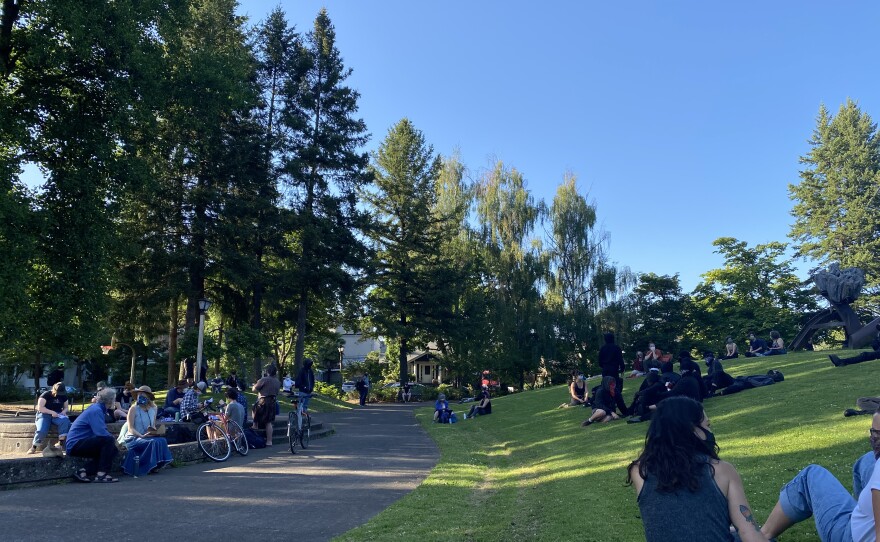Civil rights protest groups continue to challenge and lead their communities to reform two months after George Floyd’s death in Minneapolis. On Thursday, a group protested outside Sundance Natural Foods claiming it had wrongfully terminated an employee based on race. Some protestors in Eugenehave resorted to unorthodox tactics to force change.
The New Frontier Market in Eugene claims to be the oldest store in town. Standing on the corner of west8th, and Van Buren street, it hosts a variety of locally sourced products and serves residents in the surrounding neighborhoods.
Both the inside and outside of New Frontier are covered with art, flyers, announcements, and COVID-19 safety precautions. Directly through the front doors rests a sign requiring all customers to wash their hands at the sink close by. The market’s aisles and walkways are narrow, and calm music faintly plays from overhead speakers.
Employees working on the evening of July 10th were concerned when a loudly chanting group of protestors dressed head-to-toe in black surrounded the storefront.
Employees said some protestors held open the front doors and began shouting with a megaphone, while the rest of the group outside blocked street traffic and drew political messages on the ground.
These protestors were marching with an activist group called the BIPOC Liberation Collective, and the New Frontier Market was just one of their stops that evening.
The BIPOC protest, called “Anti-Racism and Anti-Capitalism,” began at Monroe Park at 6:30PM. Organizers urged participants to come prepared with shoes to march over two miles in. As people began to filter into the park, about 20 heavily armed individuals completely covered in black clothing surrounded the perimeter of the group and faced outward. One guest speaker said they were there to protect protestors.
Another speaker talked about how racism and capitalism systemically go hand in hand:
“One might claim that they are anti-racist because they believe in universal suffrage, while they fail to oppose the system of wage slavery, that when combined with the absurd voting systems of many states, results in working class people who are disproportionately Brown or Black from being able to vote at all."
BIPOC’s goal that night was to make an example of local businesses that did not outwardly support the Black Lives Matter movement.
Jason Waligoske, owner of New Frontier Market, said that there were Black Lives Matter signs on display in the store a couple of weeks before the incident. He took them down because they covered advertisements for other local businesses and were put up without his permission, but added new signs shortly thereafter.
“We got a phone call the next day," said Waligoske. "A customer heard that we had taken the sign down. So, the day after that was farmer’s market, and as soon as I got out of farmer’s market I came to the store and I removed the fisherman’s market sign and the smaller farm sign to make a spot for it, and I put it back up. There’s actually a bunch of tags around the building for Black Lives Matter as well.”
According to Waligoske, even up until BIPOC came to New Frontier, no one had reached out to him to talk about the store actively supporting the Black Lives Matter movement. He had only received negative feedback about some shirts available in store with Native art on them.
Although Waligoske was aware of some community disapproval, he was not present at New Frontier on the night of the protest. However, one of his employees, Jacob Urzua, shared his experience.
“I did see there was people with assault rifles, and I was definitely alert," said Urzua. "I had gone outside for a second to see what it was about. I had one person come up to me and ask about the sign, and the protest more seemed to shift towards the artist that we had there with the Native American shirts.”
Urzua said the protest was peaceful even though weapons were present. He and his coworker didn’t feel threatened, though protestors did shame them and urged them to quit their jobs on the spot.
BIPOC’s anti-racism protest left a lasting mark on New Frontier’s business. Some employees did quit as a direct result of the incident, and Waligoske is nervous that the store may be targeted with negative attention again.
In order to assuage the public’s perception of New Frontier, Waligoske plans to release a letter for Black Lives Matter groups and the press apologizing for his mistakes as owner, as well as explaining his views and continuing support for the political movement.
“On a grassroots level, which can be our greatest power,” says the letter’s concluding paragraph, “I want to have conversations about these issues. This is an invitation for any campaign or movement to write, call or talk to me about how I could be doing a better job to be supportive through the store or otherwise.”
The BIPOC Liberation Collective and various other activist groups still frequently host protests in Eugene and Springfield. Some protests are met with resistance by armed counter-protestors, and police have been consistently involved as well.
While tensions are still high, for Waligoske and New Frontier Market, it’s business as usual.
Copyright KLCC, 2020.









